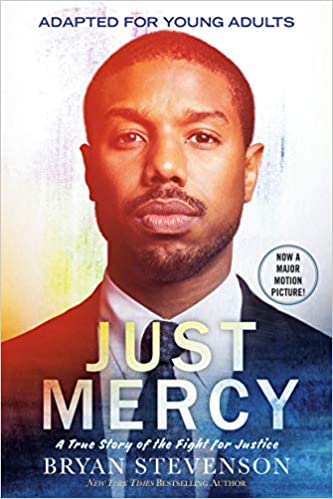
book by Bryan Stevenson
Many books addressing social justice have an edge, but Bryan Stevenson’s Just Mercy has a heart. This is a book of stories, full of heartbreak and hope. There is the story of Henry, whom Bryan meets on death row, waiting to be assigned his execution date, not wanting his family to know when it is coming for fear of the pain it will cause them. There is the story of Walter who, though innocent, spent six years on death row in Alabama’s Holman prison, and of Stevenson’s work that led to his exoneration and release. There are stories of children being tried, sentenced, and incarcerated as adults, and of Stevenson pressing for changes in laws governing this.
There are stories that make us angry, where Black people are barred from jury service, and poor people are assigned inept attorneys who are later disbarred. And stories so awful that it is hard to bear – dogs being brought into the courtroom specifically to terrify Black people who had seen dogs in other terrifying circumstances, mentally ill prisoners being abused, people on death row with no hope. But then there is the hope filled story of the “stonecatchers,” named with a biblical echo of Jesus interrupting the stoning of a woman by inviting anyone without sin to cast the first stone. In Stevenston’s life, the stonecatchers intercept those stones thrown by an unfair legal system.
Overarching all of this is the story of the author as a young law student finding his way to a life of service to those unfairly imprisoned. He tells of being uncertain of what he wanted to do with his life, and how on his first day as a young intern, he visited a man on death row and had no idea what to say. When he fumbled the meeting and angered the guard, the prisoner said, “That’s OK, just please come back.” Stevenson did come back many times and over the years they developed a deep friendship.
He tells about meeting Rosa Parks, who, when he told her of his many ideas for helping the incarcerated, leaned toward him with a smile and said, “Ooooh honey, all that work’s going to make you tired, tired, tired.” And her friend who was listening shook her finger at him saying, “That’s why you have to be brave, brave, brave.” And he did get tired, but he was brave, and he stood before the power structures of the Alabama legal system to serve the most vulnerable among us.
In 1989 Bryan Stevenson founded Equal Justice Initiative (EJI). Just Mercy tells of EJI in its infancy, with Bryan sleeping in its tiny office and on friends’ sofas. From this fragile beginning, EJI grew into a force for justice with dozens of attorneys, interns, and fellows. Their clients are poor and mostly Black; all are people who have been unjustly served by our judicial system. While there are many whose names we will not remember, the most highly publicized of EJI’s clients is Anthony Ray Hinton, released from death row in 2015 after 30 years. Just Mercy shines light on the details of the case and gives us a view into the dishonesty, ineptitude, and plain old racial prejudice that lies beneath so many of these cases. Of this case Stevenson says, “Race, poverty, inadequate legal assistance, and prosecutorial indifference to innocence conspired to create a textbook example of injustice. I can’t think of a case that more urgently dramatizes the need for reform than what has happened to Anthony Ray Hinton.”
There are days when we feel overwhelmed with all that’s wrong in the world. On these days, Just Mercy will warm our hearts and stir our souls, and maybe make us brave.
– Bobbie Hartman
NOTE: Equal Justice Initiative (EJI) is one of Westminster’s Outreach Mission Partners.
